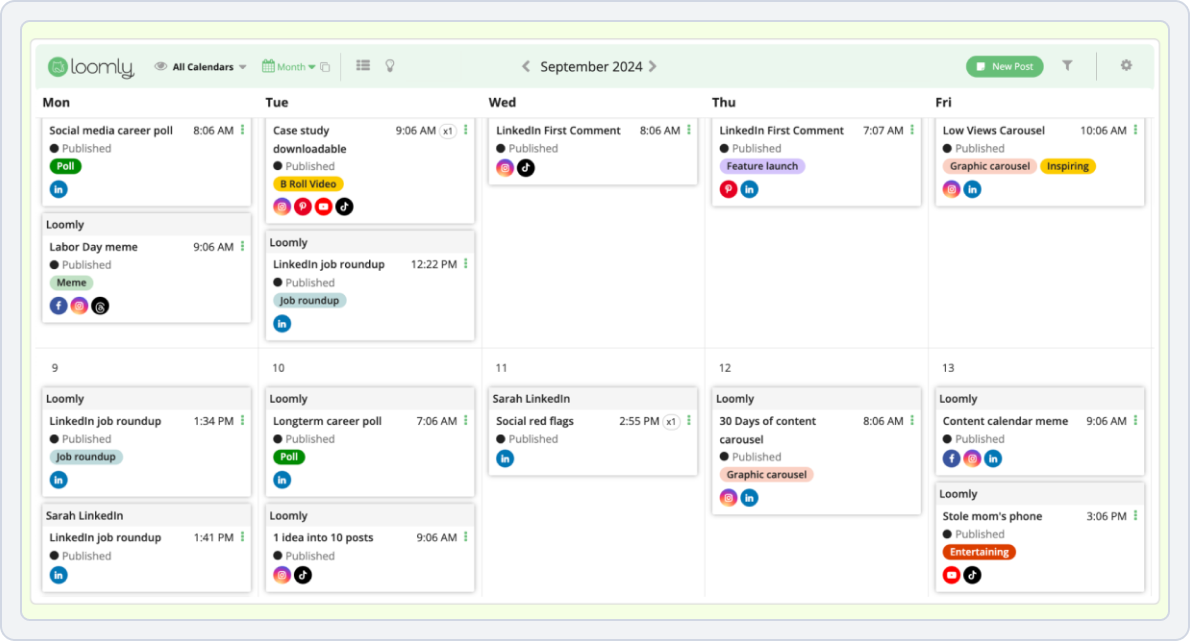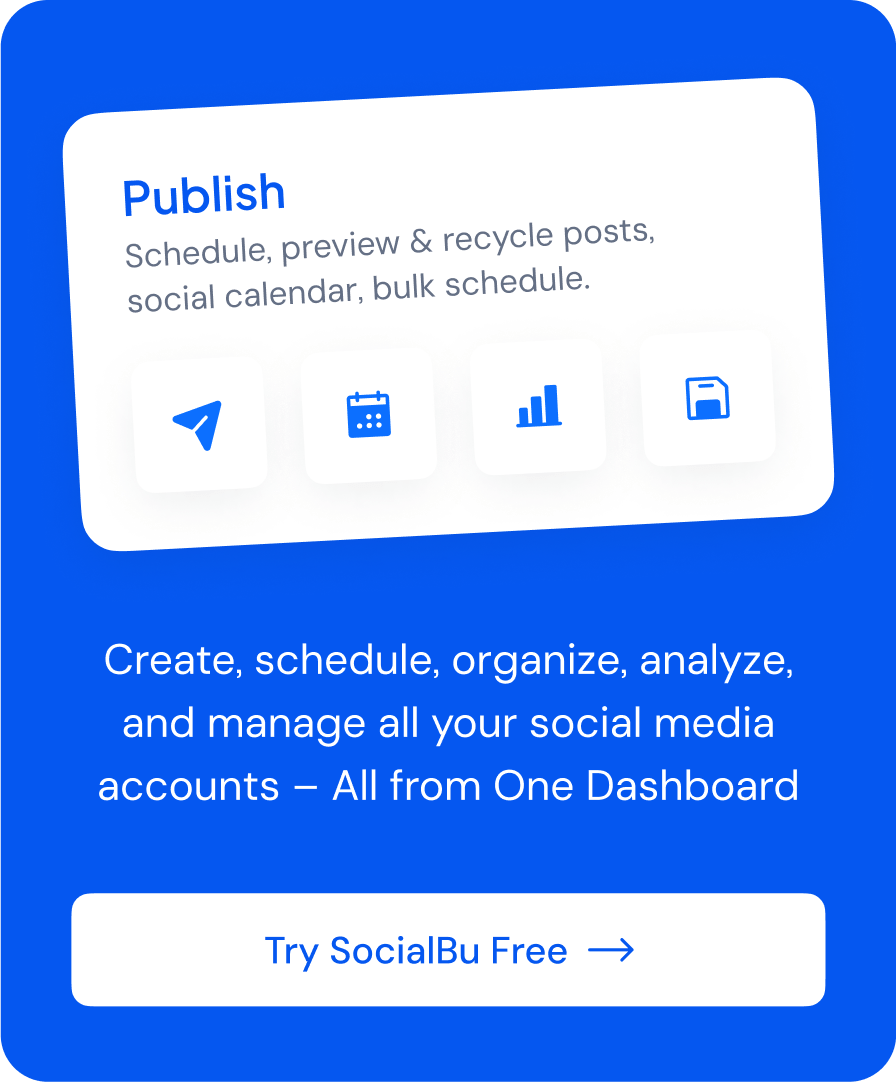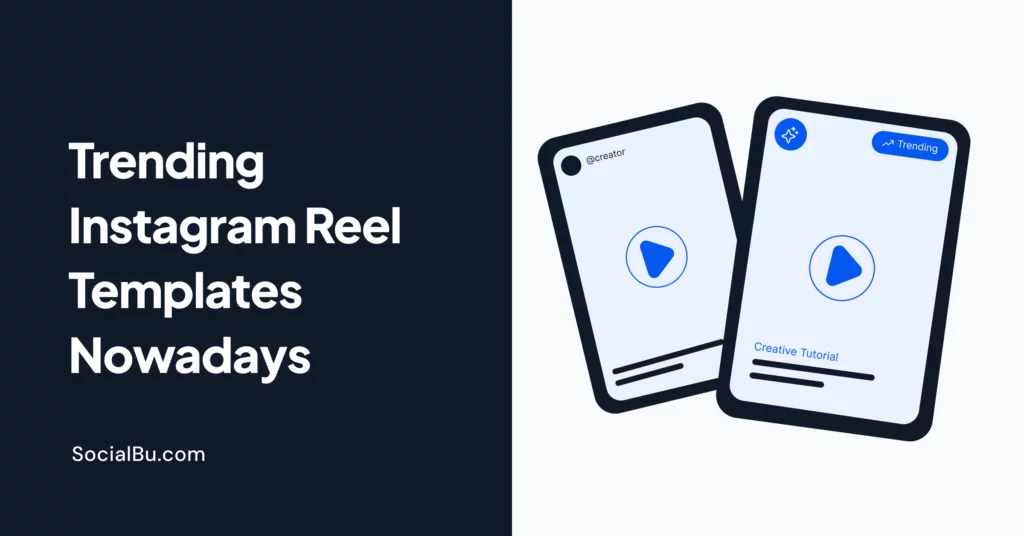If you’ve relied on CoSchedule for your marketing workflow, you already know its main draw: an all‑in‑one calendar that pulls together your projects, posts, and people. But as marketing evolves, users are looking for CoSchedule alternatives.
CoSchedule alternatives now offer more advanced AI tools, better pricing, and enhanced collaboration options.
So, whether you run a small agency, a growing brand, or a solo creative studio, this guide will help you find the best CoSchedule alternatives in 2026 that are smarter, cheaper, and easier to use.
Why Look for CoSchedule Alternatives in 2026?
CoSchedule is a marketing calendar and social media management platform built to help teams plan, schedule, and publish content across multiple channels. Teams use it to organize editorial calendars, manage social posts, and collaborate across departments in one place.
These are strong points. At the same time, many users say the per-user pricing adds up quickly, customer support responds slowly to issues, and technical problems like account disconnections happen too often.
Let’s look at what actual users are saying before deciding whether it still deserves your trust in 2026.
Insights From Real Users: Common Pain Points with CoSchedule
Here’s what most customers complain about CoSchedule.
- Entry-Level Social Calendar: I found it difficult to keep track of which platforms had posts scheduled for a specific date when there are many posts. We colour-coded our posts for each platform but I wish there was an easy way to filter them. (Camilla C. – Marketing Manager)
- Frequent Integration Breaks: It seems like our social media integrations break fairly frequently; it happens to only one at a time, but it seems to occur every 2 months or so. Whenever that happens, any scheduled social posts for that outlet fail and an admin needs to go into the settings and re-enter our account credentials to allow cross-posting from CoSchdule to resume. (Verified User in Printing)
- Date-Tracking Inconsistencies: There seems to be some discrepancy in tracking the projects on the basis of dates. Sometimes it’s difficult to track the posts scheduled on the basis of dates, this can be improved. (Bikshita B. – Marketing Consultant)
- Steeper Learning Curve: The learning curve for full use makes adoption difficult for established teams. (Kevin F. – Mid Market)
- Expensive for small business: Cons are its high cost, which can be prohibitive for a small business like mine, and a significant learning curve associated with its evergreen feature. (Marlee – own er)
The pricing, limited features, and dated interface push many toward smarter, more automated alternatives. With growing demands on content teams, relying on outdated tools slows you down more than you realize.
With these must-haves in mind, let’s dive into our list of the top 10 CoSchedule alternatives, starting with the favorite among small teams and agencies.
So, how do they really stack up? Let’s compare each tool’s features side by side.
CoSchedule Alternative#1: SocialBu
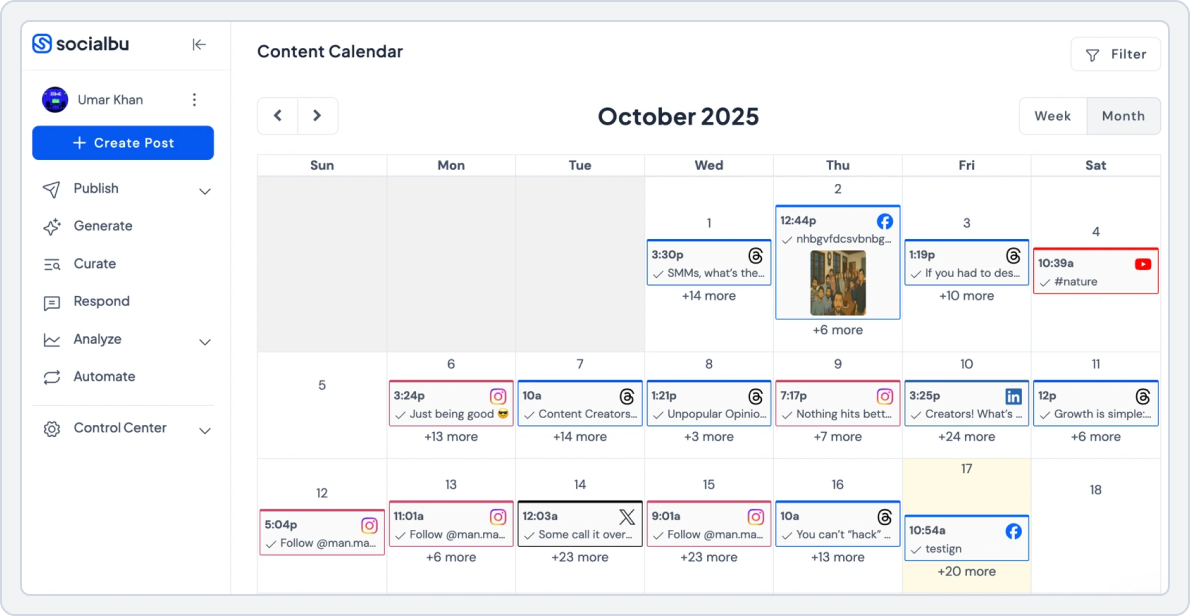
Overall Rating: ⭐⭐⭐⭐⭐ 4.7/5 (Capterra)
Starting Price: $19/month
SocialBu simplifies marketing coordination by bringing publishing, analytics, and automation together under one AI-powered platform—exactly what teams look for when exploring CoSchedule alternatives to improve workflow.
It automates caption creation, scheduling, and engagement across 12 platforms, saving hours each week. Smart automation adapts to audience behavior, while a unified inbox keeps communication organized.
For marketers seeking intelligent efficiency without rising per-user costs, SocialBu offers the balanced value many CoSchedule users want.
I use SocialBu every day and it’s a vital part of my business. Getting started was a breeze and if you have questions, you’ll have a dedicated manager who will make sure you have a good experience. The user-friendly interface and smooth integration process makes it easy to use even for a beginner. You can connect all your major social media accounts even with their lowest plan. Eeva L.- Social Media Manager
If you’re considering CoSchedule alternatives, here’s why SocialBu is one of the best CoSchedule alternatives:
- Clean, intuitive interface that eliminates the complexity and learning curve that many CoSchedule users complain about. Easy for creators, small businesses, and agencies to navigate from day one.
- Collaboration features include role-based permissions, approval workflows, shared workspaces, comments, tagging, and review steps for seamless team coordination.
- Centralized engagement with a unified social inbox to assist you in responding to comments, messages, and mentions from one place.
- Support for 12 platforms covers Instagram, TikTok, YouTube, Pinterest, Google Business, LinkedIn, Facebook, Threads, Bluesky, Reddit, and Mastodon.
- Smart Scheduling options include one-time posts, recurring posts, evergreen queues, AI captions, auto posting tools, and a bulk upload scheduler with CSV and media support.
- Automation tools feature automated comment replies, smart inbox management, auto DMs, workflow automation, and AI content creation that CoSchedule lacks.
- Analytics and tracking provide cross-platform performance tracking, engagement metrics, audience growth, historical trends, best-performing content, and optimal posting times.
CoSchedule vs. SocialBu
Placed side by side, SocialBu offers a smoother collaboration experience than CoSchedule. Its native team management tools simplify content planning, feedback, and publishing across teams.
This makes SocialBu an ideal CoSchedule alternative for creators, businesses, and agencies looking for organized workflows without the high per-user costs.
Value for money, made my workflow much faster and super easy to link all your relevant accounts. Scheduling posts is an ease and managing my social media accounts are nice as I can see feeds of any comments or messages on the app as well. Verified Reviewer- CEO and Marketing Manager
1. Content Scheduling and Planning
Planning content across multiple platforms is more flexible with SocialBu. While CoSchedule focuses heavily on campaign-based calendars and task-driven planning, SocialBu is built for day-to-day social publishing, allowing teams to plan, organize, and publish content with less friction.
Here’s what SocialBu’s content scheduling and planning allows you to do:
- Schedule posts individually, in bulk, or through recurring queues
- Organize content using a visual, drag-and-drop calendar showing drafts, scheduled, and published posts
- Reuse evergreen content automatically to maintain consistent posting
- Manage multiple brands or clients from a single dashboard
- Adjust posting schedules quickly without breaking existing content plans
SocialBu vs CoSchedule Key Takeaway: SocialBu leads in multi-platform coverage and unified inbox efficiency. CoSchedule works if you only need basic calendar scheduling for fewer networks.
2. AI-Powered Social Media Automation
Manual posting and repetitive tasks can quickly slow down social media workflows. SocialBu stands out with its unified inbox and automation features that help teams stay on top of messages, comments, and mentions. SocialBu automates real engagement tasks to save time and reduce workload.
With SocialBu’s social media automation, you can:
- Manage messages, comments, and mentions from all platforms in one dashboard.
- Respond faster with team collaboration features
- Track replies and avoid missed messages
- Improve response times without switching apps
- Streamline daily engagement for agencies, brands, and creators
Just like Buffer and Hootsuite, SocialBu also has great features such as post scheduling, managing comments & checking analytics. The best part is that it is affordable as compared to other popular social media management platforms. Verified G2 Review
SocialBu vs Coschedule Key Takeaway: SocialBu leads in multi-platform coverage and unified inbox efficiency. CoSchedule works if you only need basic calendar scheduling.
3. Team Collaboration and Approval Workflows
SocialBu centralizes teamwork without relying on emails or external tools.
With SocialBu’s collaboration features, teams can:
- Assign role-based permissions for drafting, editing, and publishing
- Set up approval workflows for managers or clients
- Collaborate using comments and internal notes within shared workspaces
- Review posts visually in the shared content calendar
SocialBu vs Coschedule Key Takeaway: SocialBu leads in team collaboration with built-in approvals and centralized communication. CoSchedule offers basic collaboration features but is more limited for teams managing multiple clients or complex workflows.
4. AI Content Generation
Creating engaging content consistently can slow down marketing workflows. SocialBu uses AI to generate platform-specific captions, suggest relevant hashtags, and optimize posting times based on audience behavior. Meanwhile, CoSchedule’s AI assistant (Mia) focuses on idea generation and first-draft content for broader marketing projects.
With SocialBu’s AI content generation, you can:
- Generate platform-specific captions optimized for engagement
- Get AI-powered hashtag suggestions to improve reach
- Optimize posting times based on audience behavior
- Speed up social content creation across multiple platforms
- Maintain consistency without manual effort
SocialBu vs CoSchedule Key Takeaway: SocialBu excels at AI-powered social content optimization, while CoSchedule’s Mia is better suited for ideation and long-form marketing content rather than daily social posting.
5. Platform Support & Integration
- SocialBu: Instagram, TikTok, YouTube, Facebook, X (Twitter), Threads, LinkedIn, Reddit, Mastodon, Pinterest, Bluesky, Google Business Profile
- CoSchedule: Facebook, LinkedIn, Instagram, X (Twitter), and Pinterest.
While CoSchedule integrates with WordPress, Google Calendar, and HubSpot, it lacks native support for TikTok, YouTube, Threads, Bluesky, and Mastodon, limiting reach for modern social teams and pushing them toward more flexible CoSchedule alternatives.
SocialBu vs Coschedule: Key Takeaway: SocialBu wins for broader platform coverage and deeper automation. CoSchedule works best for those focused only on core networks.
6. Pricing Comparison Table
Here’s how their pricing and plans compare at a glance.
| SocialBu | CoSchedule | |
|---|---|---|
| Platforms | Instagram, TikTok, YouTube, Facebook, X (Twitter), Threads, LinkedIn, Reddit, Mastodon, Pinterest, Bluesky, Google Business Profile | Facebook, Instagram, LinkedIn, Pinterest |
| Free Plan | Yes Social accounts: 2 Social platforms: 3 |
No free plan Free trial available |
| For Small Business | $19 / month – 12 social accounts – Unlimited monthly posts – 2 teams |
$29/ month – 6 social accounts – 1 team – Limited posts |
| For Agencies | $166 / month – 150 social accounts – Unlimited monthly posts – 25 teams |
$69/month – 10 social accounts – 3 users – Basic analytics |
| Verdict | Pricing is flexible, allowing teams to add or remove users and workspaces without paying for features they don’t need. Ideal for agencies managing multiple clients. | Pricing is per-user and less flexible. Smaller teams may end up paying more for limited features focused mainly on calendar-based workflows. |
SocialBu vs Coschedule Final Takeaway:
SocialBu is one of the superior CoSchedule alternatives for anyone who values automation, scalability, and affordability over a traditional calendar-based system. Its combination of AI-powered content creation, unlimited bulk scheduling, and flat monthly pricing makes it the best choice for small teams and agencies looking to streamline their workflow in 2026.
Ready to Upgrade Your Social Media Workflow?
SocialBu offers AI-powered scheduling, bulk posting, and automation across 12+ platforms—all starting at $19/month.
CoSchedule Alternative#2: RecurPost
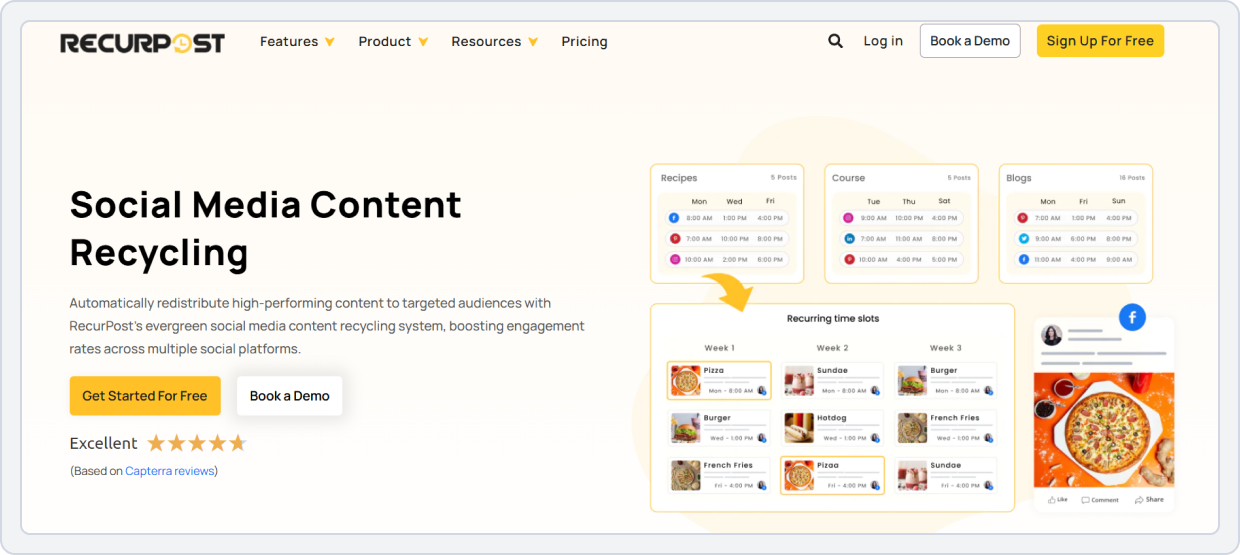
Overall Rating: ⭐⭐⭐⭐⭐ 4.7/5 (Capterra)
Starting Price: $25/month
RecurPost automates evergreen and recurring content, solving a major gap for many CoSchedule users. By categorizing posts and recycling top performers, it keeps your social feeds consistently active.
For those exploring CoSchedule alternatives to strengthen long-term workflow, RecurPost delivers hands-off consistency and real time savings.
Teams no longer need to manually reschedule campaigns—the platform ensures steady engagement across all accounts, even during the busiest periods.
CoSchedule vs. RecurPost
The feature comparison of CoSchedule vs RecurPost is as follows.
1. Content Scheduling and Planning
Planning content across multiple platforms is more flexible with RecurPost. While RecurPost is built for recurring social publishing and evergreen scheduling.
- Schedule posts individually or in bulk across multiple platforms
- Organize content using content libraries and recurring schedules
- Automatically recycle evergreen content to maintain posting consistency
RecurPost vs CoSchedule Key Takeaway: RecurPost excels at recurring content scheduling and evergreen automation, while CoSchedule is better suited for campaign planning and task-based calendar management.
2. AI-Powered Social Media Automation
RecurPost stands out with evergreen scheduling and automation that keep social accounts active with minimal manual effort. CoSchedule focuses more on workflow automation tied to campaigns, approvals, and marketing task management.
- Schedule recurring posts using evergreen content libraries
- Automatically recycle top-performing content
- Organize posts into time-based or category-based queues
RecurPost vs CoSchedule Key Takeaway: RecurPost excels at evergreen automation and recurring content scheduling, while CoSchedule is better suited for campaign planning and calendar-based workflows.
3. Team Collaboration and Workflow
RecurPost prioritizes streamlined scheduling over complex collaboration tools, making it suitable for smaller teams.
- Assign basic roles for managing social accounts
- Collaborate on content scheduling within shared dashboards
- Maintain clear publishing workflows for small teams
RecurPost vs Coschedule Key Takeaway: RecurPost’s white-label reports are perfect for agencies. CoSchedule works if you only need internal task tracking.
4. AI Content Generation
RecurPost includes a ChatGPT-powered AI writing assistant focused on generating ready-to-post social captions quickly.
- Generate social media captions using AI
- Create engaging content ideas when you run out of inspiration
- Speed up content creation without manual drafting
RecurPost vs CoSchedule Key Takeaway: RecurPost offers simple, caption-focused AI content generation for social media, while CoSchedule’s Mia provides more advanced AI tools for ideation and long-form marketing content.
5. Platform Support & Integration
- RecurPost: Facebook, X (Twitter), LinkedIn, Instagram, Pinterest, and Google Business Profile
- CoSchedule: Facebook, LinkedIn, Instagram, X (Twitter), and Pinterest.
However, CoSchedule’s connections focus mostly on standard scheduling and lack deeper evergreen automation or recurring post queues that RecurPost offers across its supported networks.
RecurPost vs CoSchedule Key Takeaway: RecurPost excels at evergreen scheduling and recurring content across key networks, while CoSchedule fits simpler, one‑time campaign planning.
6. Pricing Comparison Table
Here’s how their pricing and plans compare at a glance.
| RecurPost | CoSchedule | |
|---|---|---|
| Platforms | Instagram, TikTok, YouTube, Facebook, X (Twitter), LinkedIn, Pinterest, Reddit, Google Business Profile | Facebook, Instagram, LinkedIn, Pinterest |
| Personal / Standard | Personal: $25/month • 5 social accounts • 1 user • 1,000 posts in the library • Evergreen automation |
$29/ month – 6 social accounts – 1 team – Limited posts |
| Professional / Suite | Professional: $79/month • 20 accounts • 5 team members • Unlimited content • White-label reports |
$69/month – 10 social accounts – 3 users – Basic analytics |
| Agency / Enterprise | Enterprise (custom) • Custom social profles • Multi-client support |
Enterprise (custom) • Per-user pricing |
| Verdict | Pricing is flexible, allowing teams to add or remove users and workspaces without paying for features they don’t need. Ideal for agencies managing multiple clients. | Pricing is per-user and less flexible. Smaller teams may end up paying more for limited features focused mainly on calendar-based workflows. |
RecurPost vs Coschedule Final Takeaway:
RecurPost is the ideal CoSchedule alternative for anyone who prioritizes evergreen content automation over manual calendar management. Its category-based recycling system and budget-friendly pricing make it the best choice for small businesses focused on consistent, long-term content strategies.
CoSchedule Alternative#3: Loomly
Overall Rating: ⭐⭐⭐⭐⭐ 4.7/5 (G2)
Starting Price: $42/month
Loomly blends structure and creativity for teams that outgrow CoSchedule’s calendar-first approach. Its visual workspace brings ideas, approvals, and live post previews together, making collaboration and campaign planning smoother.
With AI-driven trend monitoring and real-time optimization tips, Loomly helps teams refine content faster. Among CoSchedule alternatives, it stands out as a strong choice for designers, agencies, and creative marketers who prefer visually streamlined workflows.
CoSchedule vs. Loomly
The feature comparison of CoSchedule vs Loomly is as follows.
1. Content Scheduling and Planning
Planning content across multiple platforms is more flexible with Loomly. Loomly offers a visual and interactive workspace explicitly designed for social media planning.
- Discover trending topics and content ideas automatically
- Get AI-suggested captions and hashtags
- Create content faster with real-time insights
Loomly vs CoSchedule Key Takeaway: Loomly excels in visual planning and multi-platform scheduling, while CoSchedule is better suited for campaign-focused calendars and structured marketing workflows.
2. AI-Powered Social Media Automation
Manual posting and repetitive tasks can quickly slow down social media workflows. Loomly stands out with its AI-powered automation features that help users schedule, optimize, and draft posts efficiently. It automates real publishing tasks to save time and reduce workload.
- Manage unlimited scheduled posts across 10+ platforms
- Preview post designs before publishing
- Plan content visually from one dashboard
Loomly vs CoSchedule Key Takeaway: Loomly leads in AI-powered drafting and scheduling for social media, while CoSchedule focuses more on campaign-based calendar automation and task management.
3. Team Collaboration and Workflow
Loomly centralizes teamwork and helps teams collaborate on content creation and scheduling without relying on emails or external chat apps. It simplifies real collaboration tasks to save time and reduce confusion.
- Assign roles and permissions for team members
- Set up approval workflows for managers or clients
- Collaborate using comments and internal notes
Loomly vs CoSchedule Key Takeaway:Loomly excels in centralized collaboration and approval workflows, while CoSchedule is better for structured campaign-based teamwork and task-driven calendars.
4. AI Content Generation
Creating fresh content consistently can slow down social media workflows. Loomly uses AI to generate post ideas, first-draft captions, and optimized copy for each platform, helping teams overcome writer’s block quickly.
- Generate platform-specific post ideas and captions
- Draft engaging content quickly without manual effort
- Optimize copy based on best practices for each network
Loomly vs CoSchedule Key Takeaway: Loomly excels at AI-powered social media content creation, while CoSchedule’s Mia is better suited for ideation and long-form marketing projects beyond social posts.
5. Platform Support & Integration
Loomly
- Facebook, Instagram, LinkedIn, Pinterest, YouTube, TikTok, and Google Business Profile
CoSchedule
- Facebook, LinkedIn, Instagram, X (Twitter), and Pinterest.
While CoSchedule connects smoothly with WordPress and HubSpot for content marketing, it lacks native integration for YouTube and TikTok, two major channels Loomly handles effortlessly for expanding audience reach.
Loomly vs CoSchedule Key Takeaway: Loomly wins for better visual content integration and broader platform coverage, while CoSchedule remains centered on traditional social and blog scheduling.
6. Pricing Comparison Table
Here’s how their pricing and plans compare at a glance.
| Loomly (Monthly Pricing) | CoSchedule (Monthly Pricing) | |
|---|---|---|
| Platforms | Instagram, TikTok, YouTube, Facebook, LinkedIn, Pinterest, X (Twitter) | Facebook, Instagram, LinkedIn, Pinterest |
| Base / Standard | Base: $42/month • 10 social accounts • 2 users • Post previews • Trend monitoring |
$29/ month – 6 social accounts – 1 team – Limited posts |
| Advanced / Suite | Advanced: $175/month • 60 accounts • Unlimited users • Approval workflows • AI suggestions |
$69/month – 10 social accounts – 3 users – Basic analytics |
| Enterprise | Enterprise: • 61 accounts • Unlimited users • 24/7 support |
Enterprise (custom) • Per-user pricing |
| Verdict | Offers feature-rich, all-in-one plans that are ideal for teams. Pricing is based on account limits and features, not individual users, making it more scalable. | Pricing is per-user, which can become expensive for teams. Features appear more limited and focused on calendar-based task management rather than a full social media suite. |
Loomly vs CoSchedule Final Takeaway:
Loomly is one of the perfect CoSchedule alternatives for visually focused teams that need strong collaboration features and intuitive planning tools. Its real-time post previews and AI-driven trend monitoring make it ideal for creative marketers and agencies who value design as much as scheduling.
CoSchedule Alternative#4: Asana

Overall Rating: ⭐⭐⭐⭐⭐ 4.7/5 (G2)
Starting Price: $10.99/month
Asana moves marketing coordination beyond posting schedules into full campaign management. For teams seeking a CoSchedule alternative with stronger workflow structure, it offers advanced task automation, timelines, and goal tracking.
Campaigns flow from planning to publishing with clear visibility and accountability, while AI-powered automation reduces manual task management.
Asana is ideal for marketing teams and agencies that need the organizational strength to scale beyond a basic content calendar.
CoSchedule vs. Asana
The feature comparison of CoSchedule vs Asana is as follows.
1. Content Scheduling and Planning
Asana integrates with social media and creative platforms, letting teams visualize schedules, review assets, and manage campaigns across multiple channels. It keeps content organized and approvals clear.
- Visualize production schedules in Calendar and Board views
- Review creative assets directly within tasks
- Connect with tools like Adobe Creative Cloud
Asana vs CoSchedule Key Takeaway: Asana excels at flexible, cross-platform campaign management, while CoSchedule works best for native social media scheduling.
2. AI-Powered Social Media Automation
Asana itself doesn’t automate social posting but integrates with social media tools to streamline workflows, track tasks, and manage campaign notifications. It helps teams stay organized and reduces manual follow-ups.
- Integrate with social tools to track scheduled posts
- Automate task notifications and reminders for your team
- Streamline campaign workflows without switching apps
Asana vs CoSchedule Key Takeaway: Asana excels at workflow automation and task management, while CoSchedule provides direct social media publishing automation.
3. Team Collaboration and Workflow
Asana centralizes teamwork by allowing teams to assign tasks, track progress, leave comments, and manage approvals in one platform. It keeps all project communications and feedback organized.
- Assign roles and permissions for team members
- Track task progress and deadlines
- Comment and provide feedback directly within tasks
Asana vs CoSchedule Key Takeaway: Asana excels at flexible team collaboration and workflow management, while CoSchedule focuses on structured calendar-based approvals.
4. AI Content Generation
Asana doesn’t generate content directly but integrates with AI tools to help teams plan and draft posts efficiently. This keeps content creation organized.
- Integrate with AI tools to draft posts
- Collaborate on content planning within tasks
- Track and store content drafts for the team
Asana vs CoSchedule Key Takeaway: Asana relies on integrations for AI content, while CoSchedule has built-in AI for drafting and ideation.
5. Platform Support & Integration
- Asana: Facebook, LinkedIn, Twitter (via integrations), Slack, Google Drive, Dropbox, Canva, Zapier, and HubSpot
- CoSchedule: Facebook, LinkedIn, Instagram, X (Twitter), and Pinterest.
CoSchedule focuses primarily on native social scheduling and marketing calendar management, while Asana leans on integrations to support social teams indirectly through workflow automation and task tracking.
Asana vs CoSchedule Key Takeaway: Asana shines for cross‑department collaboration and workflow integration, while CoSchedule specializes in social scheduling and campaign calendars.
6. Pricing Comparison Table
Here’s how their pricing and plans compare at a glance.
| Asana (Monthly Pricing) | CoSchedule (Monthly Pricing) | |
|---|---|---|
| Platforms | Web, iOS, Android | Facebook, Instagram, LinkedIn, Pinterest |
| Basic / Free | Basic: Free • Up to 15 users • Calendar & list view • Core integrations |
Free (limited) • Basic calendar only |
| Starter / Standard | Starter: $10.99/user • Automation rules • Timeline view |
$29/ month – 6 social accounts – 1 team – Limited posts |
| Advanced / Suite | Advanced: $24.99/user • Workflows & approvals • Dashboards |
$69/month – 10 social accounts – 3 users – Basic analytics |
| Verdict | A powerful, general-purpose project management tool with a generous free plan. Ideal for managing complex workflows and team collaboration, but not a dedicated social media scheduler. | A niche tool focused specifically on marketing and social media calendars. The per-user pricing is higher, and it offers fewer general project management features. |
Asana vs CoSchedule Final Takeaway:
Asana is the go-to CoSchedule alternative for teams that need robust project management alongside their content planning. Its advanced workflow automation and goal tracking make it ideal for marketing departments managing complex campaigns beyond simple post scheduling.
CoSchedule Alternative#5: ClickUp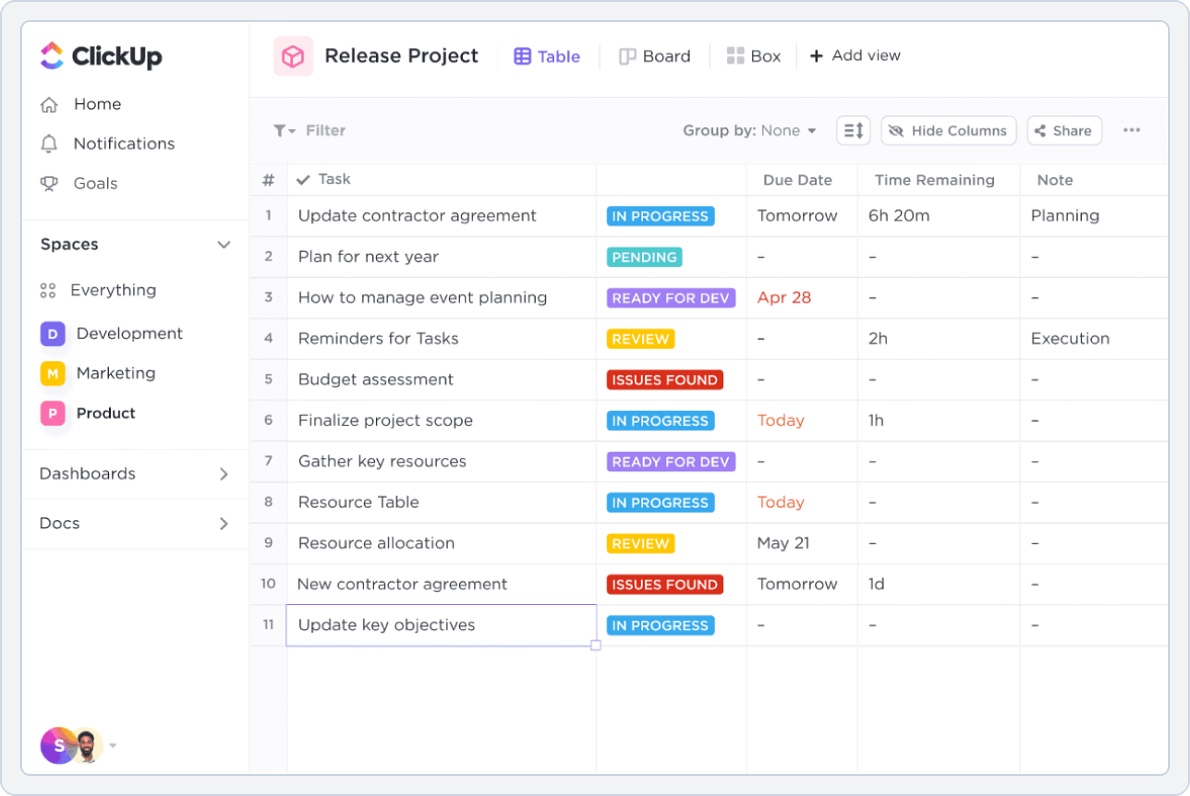
Overall Rating: ⭐⭐⭐⭐⭐ 4.6/5 (Capterra)
Starting Price: $7/month
ClickUp turns scattered content calendars into a centralized marketing workspace that automates workflows and unites teams. Built-in AI support speeds up writing, ideation, and reporting, making it a strong CoSchedule alternative for high-volume marketing.
Teams can manage social posts, creative requests, and analytics from one customizable dashboard.
Designed for agencies and growing brands, ClickUp delivers powerful workflow control at a lower per-user cost than CoSchedule.
CoSchedule vs.ClickUp
The feature comparison of CoSchedule vs ClickUp is as follows.
1. Content Scheduling and Planning
ClickUp isn’t built primarily for social posting, but it does allow teams to plan content and campaigns with its flexible task, Calendar, and Board views. Teams can organize projects, track deadlines, and attach creative assets.
- Plan campaigns and content using Calendar and Board views
- Track deadlines and milestones across multiple projects
- Attach and review creative assets directly in tasks
ClickUp vs CoSchedule Key Takeaway: ClickUp excels at flexible project and content planning, while CoSchedule is better for native social media scheduling and publishing.
2. AI-Powered Social Media Automation
ClickUp doesn’t post directly to social media but helps teams automate workflows, reminders, and task notifications to stay on top of content schedules. It reduces manual follow-ups and keeps projects on track.
- Automate task notifications and reminders
- Track content progress across campaigns
- Set recurring tasks for social media workflows
ClickUp vs CoSchedule Key Takeaway: ClickUp excels at workflow automation and task tracking, while CoSchedule offers direct social media scheduling and publishing automation.
3. Team Collaboration and Workflow
ClickUp centralizes teamwork by letting teams assign tasks, leave comments, track progress, and manage approvals all in one platform. It keeps project communication organized and transparent.
- Assign roles and permissions for team members
- Track task progress and deadlines
- Comment and provide feedback directly within tasks
ClickUp vs CoSchedule Key Takeaway: ClickUp excels at flexible team collaboration and workflow management, while CoSchedule focuses on structured calendar-based approvals.
4. AI Content Generation
ClickUp features an integrated AI assistant called ClickUp Brain (formerly ClickUp AI) that helps with content generation and workflow automation. It allows teams to draft posts, brainstorm ideas, and streamline content tasks.
- Generate social media posts and content ideas with ClickUp Brain
- Automate workflows for content creation and approvals
- Collaborate on content planning within tasks
ClickUp vs CoSchedule Key Takeaway: ClickUp uses ClickUp Brain for AI-assisted content and workflow automation, while CoSchedule offers built-in AI for drafting and ideation.
5. Platform Support & Integration
- ClickUp: Facebook, LinkedIn, X (Twitter) (via integrations), Slack, Google Drive, Dropbox, Canva, Zapier, and Make (Integromat)
- CoSchedule: Facebook, LinkedIn, Instagram, X (Twitter), and Pinterest.
While CoSchedule centers on built‑in social publishing, ClickUp relies on integrations to connect content, assets, and publishing workflows.
ClickUp vs CoSchedule Key Takeaway: ClickUp wins for comprehensive workflow automation and flexible integrations, while CoSchedule focuses on dedicated social scheduling and campaign organization.
6. Pricing Comparison Table
Here’s how their pricing and plans compare at a glance.
| ClickUp (Monthly Pricing) | CoSchedule (Monthly Pricing) | |
|---|---|---|
| Platforms | Web, iOS, Android | Facebook, Instagram, LinkedIn, Pinterest |
| Unlimited / Calendar | Unlimited: $7/user • Unlimited dashboards • Automations • ClickUp Brain AI |
$29/ month – 6 social accounts – 1 team – Limited posts |
| Business / Suite | Business: $12/user • 1,000+ integrations • Workflow automation |
$69/month – 10 social accounts – 3 users – Basic analytics |
| Enterprise | Enterprise: Custom • SSO & Admin controls • 24/7 support |
Enterprise: Custom |
| Verdict | An extremely powerful and cost-effective ‘all-in-one’ productivity platform. Its low per-user price, extensive features like AI and automation, and vast integrations make it a superior choice for managing complex projects. | A more expensive tool focused on marketing calendars. It lacks ClickUp’s broad project management capabilities, AI, and advanced automation, offering less value at a higher per-user cost. |
ClickUp vs CoSchedule Final Takeaway:
ClickUp is the ultimate CoSchedule alternative for teams seeking an all-in-one workspace with powerful AI and workflow automation. Its unbeatable $7 per user pricing and 1,000+ integrations make it perfect for agencies and growing brands that need enterprise-level features without the enterprise price tag.
CoSchedule Alternative#6: StoryChief
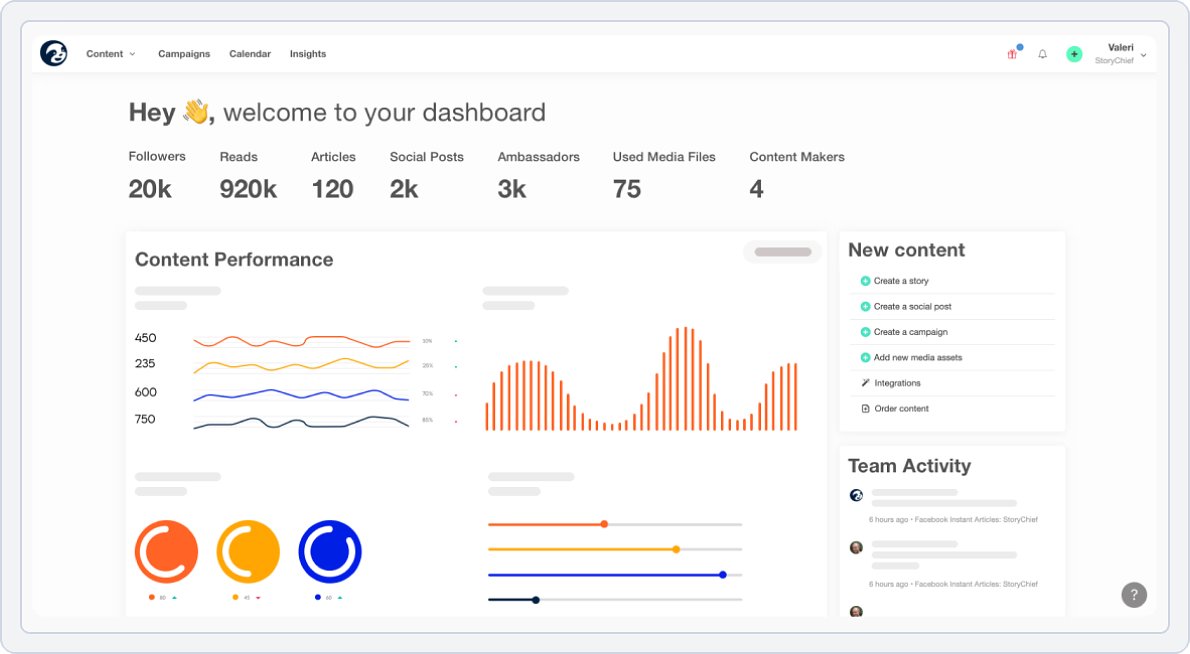
Overall Rating: ⭐⭐⭐⭐⭐ 4.6/5 (G2)
Starting Price: $27/Quarter
StoryChief delivers a multi-channel content ecosystem that unites blogging, social media, newsletters, and SEO in one campaign builder ideal for marketers exploring CoSchedule alternatives to boost productivity.
Built-in SEO scoring, collaborative editing, and one-click distribution replace the mix of tools many CoSchedule users rely on.
By linking content creation directly to performance analytics, StoryChief lets teams plan, publish, and track everything from a single insights-driven hub.
CoSchedule vs. StoryChief
The feature comparison of CoSchedule vs StoryChief is as follows.
1. Content Scheduling and Planning
StoryChief focuses on content marketing with multi-channel publishing, letting teams schedule and distribute content across social media, blogs, and newsletters.
- Schedule posts across multiple platforms including social media and blogs
- Manage content calendars and campaigns in one workspace
- Set up approval workflows for managers or clients
StoryChief vs CoSchedule Key Takeaway: StoryChief excels at multi-channel content marketing and approvals, while CoSchedule focuses on social media scheduling and campaign calendars.
2. AI-Powered Social Media Automation
StoryChief helps teams automate multi-channel content publishing, ensuring posts go live on social media, blogs, and newsletters without manual effort. It also streamlines workflow notifications and approvals.
- Automatically publish content across social media, blogs, and newsletters
- Schedule recurring posts and campaigns in advance
- Set up workflow notifications for approvals and tasks
StoryChief vs CoSchedule Key Takeaway: StoryChief excels at multi-channel automation, while CoSchedule focuses on native social media publishing.
3. Team Collaboration and Workflow
StoryChief centralizes teamwork by enabling teams to collaborate on content creation, approvals, and publishing in a single platform. It keeps communication and feedback organized.
- Assign roles and permissions for team members
- Track content progress and approvals
- Leave comments and internal notes on drafts
StoryChief vs CoSchedule Key Takeaway: StoryChief excels at collaborative multi-channel content workflows, while CoSchedule focuses on calendar-based campaign approvals.
4. AI Content Generation
StoryChief includes AI-powered tools to help teams draft social media posts, blog content, and newsletters quickly, reducing writer’s block and speeding up content creation.
- Generate posts for social media, blogs, and newsletters
- Draft content quickly using AI assistance
- Collaborate on content creation within the platform
StoryChief vs CoSchedule Key Takeaway: StoryChief excels at AI-assisted multi-channel content creation, while CoSchedule focuses on AI for drafting and ideation of marketing campaigns.
5. Platform Support & Integration
- StoryChief: LinkedIn, Facebook, X (Twitter), Instagram, Google Business Profile, WordPress, Medium, Ghost, Webflow, and HubSpot
- CoSchedule: Facebook, LinkedIn, Instagram, X (Twitter), and Pinterest.
CoSchedule focuses on core social media networks, while StoryChief expands far beyond, with deep integrations with blog, CMS, and SEO tools, enabling teams to manage entire campaigns from creation to publishing.
StoryChief vs CoSchedule Key Takeaway: StoryChief wins for its all‑in‑one publishing network and blog integration depth. CoSchedule suits teams centered purely on social media scheduling.
6. Pricing Comparison Table
Here’s how their pricing and plans compare at a glance.
| StoryChief (Quartely Pricing) | CoSchedule (Monthly Pricing) | |
|---|---|---|
| Platforms | Web, iOS, Android | Facebook, Instagram, LinkedIn, Pinterest |
| Starter / Calendar | Starter: $27/month • 3 social channels • Built‑in SEO tools • 1 user |
$29/ month – 6 social accounts – 1 team – Limited posts |
| Team / Suite | Team: $14/month • 10 users • Workflow approvals |
$69/month – 10 social accounts – 3 users – Basic analytics |
| Enterprise | Enterprise: Custom • 100+ integrations • Dedicated support |
Enterprise: Custom |
| Verdict | Extremely cost-effective for teams, with plans that include multiple users for a low flat fee. The inclusion of SEO tools provides added value for content-focused marketing | Pricing is strictly per-user and billed quarterly, making it less flexible and significantly more expensive for teams. |
StoryChief vs CoSchedule Final Takeaway:
StoryChief is the premier CoSchedule alternative for content marketing teams that need multi-channel publishing with built-in SEO optimization. Its ability to unify blogs, social media, newsletters, and podcasts under one campaign builder makes it ideal for organizations focused on content-driven growth.
CoSchedule Alternative#7: Mailchimp
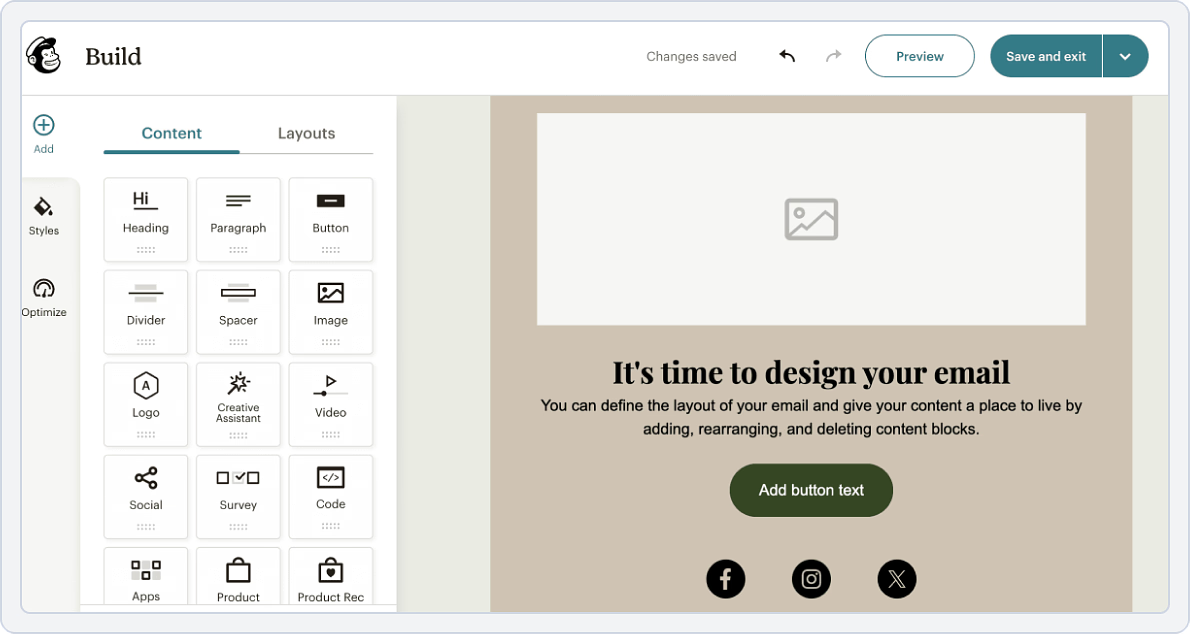
Overall Rating: ⭐⭐⭐⭐ 4.4/5 (G2)
Starting Price: $10/month (contact-based)
Mailchimp unifies email, social, and advertising automation into one coordinated platform, making it a smart CoSchedule alternative for data-driven marketing teams.
AI-powered segmentation and predictive analytics enable highly personalized campaigns, keeping workflows precise and responsive.
By linking content creation with customer behavior insights, Mailchimp helps brands nurture relationships and run multi-channel campaigns from a single, scalable dashboard.
CoSchedule vs. Mailchimp
The feature comparison of CoSchedule vs Mailchimp is as follows.
1. Content Scheduling and Planning
Mailchimp lets teams plan and schedule email campaigns, audience segments, and automated journeys using Calendar and automation tools, helping users organize content delivery across email channels. It keeps campaign workflows and timelines easy to manage.
- Plan and schedule email campaigns with ease
- Segment audiences for targeted messaging
- Visualize campaign timelines on a calendar
Mailchimp vs CoSchedule Key Takeaway: Mailchimp excels at email campaign scheduling and automation, while CoSchedule focuses on social media and editorial calendar planning.
2. AI-Powered Social Media Automation
Mailchimp automates email campaigns and customer journeys, allowing teams to send personalized messages and follow-ups without manual effort. It keeps communication consistent and timely.
- Automate email campaigns and follow-ups
- Set up customer journeys and triggers
- Personalize messages based on audience behavior
Mailchimp vs CoSchedule Key Takeaway: Mailchimp excels at email automation and customer journey workflows, while CoSchedule focuses on social media scheduling and publishing.
3. Team Collaboration and Workflow
Mailchimp allows teams to collaborate on campaigns, share templates, and track feedback within the platform, keeping email marketing workflows organized.
-
Assign campaign access and roles to team members
-
Share templates and marketing assets for collaboration
-
Track feedback and approval status within campaigns
Mailchimp vs CoSchedule Key Takeaway: Mailchimp excels at team collaboration for email marketing, while CoSchedule focuses on social media and editorial calendar approvals.
4. AI Content Generation
Mailchimp uses AI to help generate email copy, subject lines, and personalized content for campaigns, making it easier to create engaging messages quickly.
- Generate email copy and subject lines using AI
- Personalize content for different audience segments
- Automate content suggestions for campaigns
Mailchimp vs CoSchedule Key Takeaway: Mailchimp excels at AI-assisted email content generation, while CoSchedule focuses on AI for social media and marketing campaign drafting.
5. Platform Support & Integration
Mailchimp
- Facebook, Instagram, LinkedIn, Twitter (X), Shopify, WooCommerce, Squarespace, Canva, and Google Analytics
CoSchedule
While CoSchedule is built around social scheduling and campaign calendars, Mailchimp extends its capabilities into full email marketing, eCommerce, and advertising integrations.
- Facebook, LinkedIn, Instagram, X (Twitter), and Pinterest.
Mailchimp vs CoSchedule Key Takeaway: Mailchimp excels at combining email automation with social promotion, while CoSchedule focuses mainly on social calendar coordination.
6. Pricing Comparison Table
Here’s how their pricing and plans compare at a glance.
| Mailchimp (Monthly Pricing) | CoSchedule (Monthly Pricing) | |
|---|---|---|
| Platforms | Web, iOS, Android | Facebook, Instagram, LinkedIn, Pinterest |
| Free / Basic | Core: $10 • 500 contacts • Basic automations • Social ads |
$29/ month – 6 social accounts – 1 team – Limited posts |
| Essentials / Suite | Standard: $20/month • Email + social • 5000 emails |
$69/month – 10 social accounts – 3 users – Basic analytics |
| Premium / Enterprise | Premium: $350/month • Predictive AI analytics • Priority support |
Enterprise: Custom |
| Verdict | An all-in-one marketing platform where email is the core focus, supplemented by social media tools. Pricing is based on contacts and features, offering advanced tools like A/B testing and AI. | A specialized social media calendar tool. Its per-user pricing model is less scalable, and it lacks the broader marketing automation and analytics capabilities of Mailchimp. |
Mailchimp vs CoSchedule Final Takeaway:
Mailchimp is the smart CoSchedule alternative for businesses that prioritize email marketing with integrated social media capabilities. Its AI-powered segmentation, predictive analytics, and affordable $13 starting price make it perfect for teams wanting unified email and social campaigns without juggling multiple tools.
CoSchedule Alternative#8: FeedHive
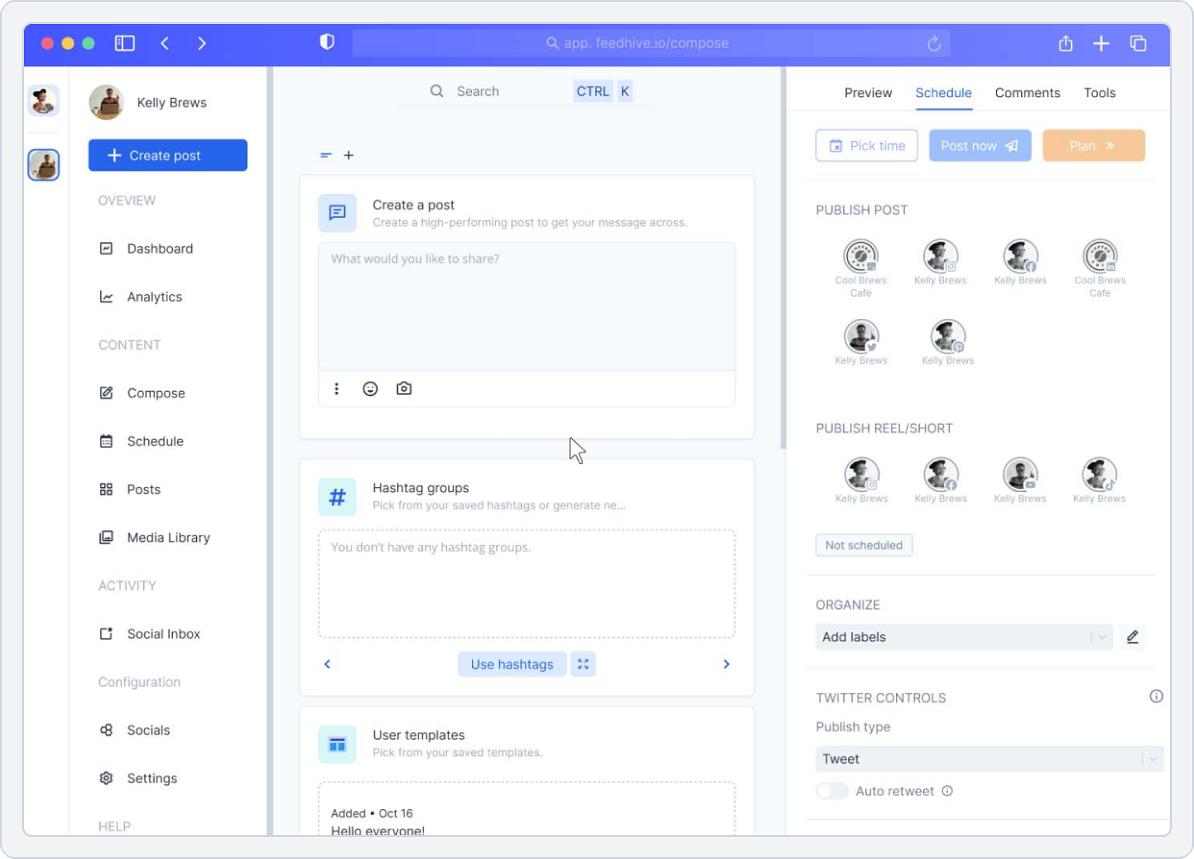
Overall Rating: ⭐⭐⭐⭐⭐ 4.6/5 (Capterra)
Starting Price: $19/month
FeedHive replaces manual posting with AI that predicts engagement and optimizes scheduling for maximum reach, making it a strong CoSchedule alternative for automation-focused teams.
Its content generator creates captions, suggests hashtags, and evaluates performance before publishing.
Real-time dynamic queues adapt to audience activity, keeping feeds active and effective. FeedHive helps teams move from guesswork to data-driven consistency without sacrificing creativity.
1. Content Scheduling and Planning
FeedHive provides flexible social content planning with a visual calendar and smart queues that help teams schedule posts without friction. Its intuitive workspace makes organizing and adjusting social campaigns easy.
- Schedule posts across multiple platforms with ease
- Use an intuitive visual calendar to plan content
- Organize recurring and queued content effortlessly
FeedHive vs CoSchedule Key Takeaway: FeedHive excels at flexible and intuitive social content scheduling, while CoSchedule focuses on structured calendar‑based planning.
2. AI-Powered Social Media Automation
FeedHive helps teams automate social posting, content queues, and engagement reminders, reducing manual effort and keeping accounts active. It focuses on smart scheduling and post optimization.
- Automate posting across multiple social platforms
- Create recurring content queues for evergreen posts
- Set reminders for engagement and follow-ups
FeedHive vs CoSchedule Key Takeaway: FeedHive excels at smart social media automation, while CoSchedule focuses on structured calendar-based publishing.
3. Team Collaboration and Workflow
FeedHive allows teams to collaborate on content creation, scheduling, and approval within a single platform, keeping communication and feedback organized.
- Assign roles and permissions for team members
- Collaborate on post drafts with comments and notes
- Track content approvals and workflow progress
FeedHive vs CoSchedule Key Takeaway: FeedHive excels at collaborative social media workflows, while CoSchedule focuses on structured calendar-based team approvals.
4. AI Content Generation
FeedHive features AI-powered tools to help teams generate social media captions, post ideas, and content suggestions quickly, reducing writer’s block.
- Generate social media captions and post ideas using AI
- Brainstorm content quickly without manual drafting
- Collaborate on AI-generated content within the platform
FeedHive vs CoSchedule Key Takeaway: FeedHive excels at AI-assisted social media content generation, while CoSchedule focuses on AI for broader marketing campaign drafting and ideation.
5. Platform Support & Integration
FeedHive
- X (Twitter), LinkedIn, Facebook, Instagram, and YouTube
CoSchedule
- Facebook, LinkedIn, Instagram, X (Twitter), and Pinterest.
FeedHive’s strength lies in its advanced AI‑powered scheduling, analytics, and idea generation features, but it covers fewer networks overall. CoSchedule offers similar core platforms but lacks FeedHive’s smart automation and performance‑based recommendations.
FeedHive vs CoSchedule Key Takeaway: FeedHive wins for AI‑driven publishing and smart analytics, while CoSchedule suits those who prefer manual scheduling across the main social channels.
6. Pricing Comparison Table
Here’s how their pricing and plans compare at a glance.
| FeedHive (Monthly Pricing) | CoSchedule (Monthly Pricing) | |
|---|---|---|
| Platforms | TikTok, YouTube, Facebook, X (Twitter), LinkedIn, Pinterest, Threads, Google Business | Facebook, Instagram, LinkedIn, Pinterest |
| Creator / Calendar | Creator: $19/month • AI caption & hashtag ideas • 10 platforms • Single user |
$29/ month – 6 social accounts – 1 team – Limited posts |
| Business / Suite | Business: $99/month • Multi-user access • Analytics dashboard |
$69/month – 10 social accounts – 3 users – Basic analytics |
| Agency / Enterprise | Agency: $299/month • Clients & teams • Priority support |
Enterprise: Custom |
| Verdict | A modern, AI-powered tool with significantly more platform support and advanced features for a much lower price. The flat-rate pricing for teams offers exceptional value. | A more traditional calendar tool with fewer supported platforms and features. The high per-user cost makes it an expensive choice for teams compared to more feature-rich competitors. |
FeedHive vs CoSchedule Final Takeaway:
If you are looking for an AI-powered CoSchedule alternative, then FeedHive is a great tool for creators and marketers who want intelligent content optimization without the manual effort. Its predictive engagement forecasts and dynamic scheduling make it perfect for teams ready to replace guesswork with data-driven posting strategies.
CoSchedule Alternative#9: OneUp
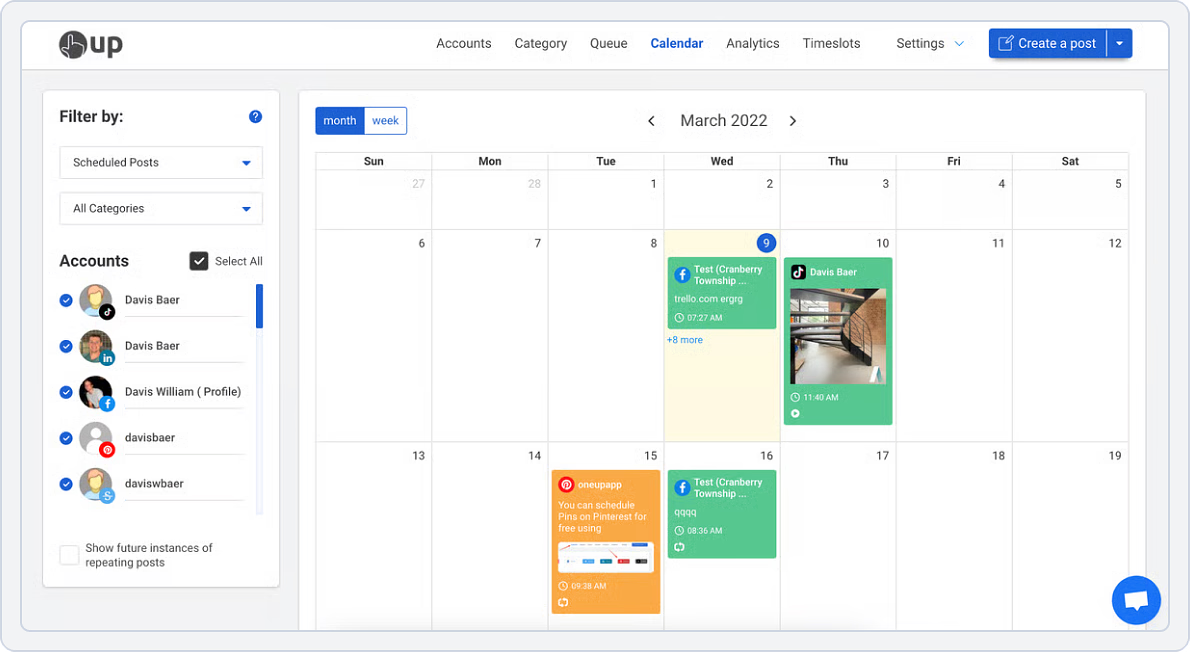
Overall Rating: ⭐⭐⭐⭐ 4.3/5 (Capterra)
Starting Price: $18/month
OneUp delivers simplicity and stability for marketers who want CoSchedule-style scheduling without the complexity or high per-user pricing.
It automates post recycling, bulk publishing, and multi-account scheduling in just a few clicks. Ideal for small teams managing tight budgets, it adds sustainable structure to daily operations.
CoSchedule vs. OneUp
The feature comparison of CoSchedule vs OneUp is as follows
1. Content Scheduling and Planning
OneUp makes content planning and scheduling straightforward with its calendar and smart queue system, allowing users to schedule posts across multiple social platforms in advance. It also supports recurring posts to keep accounts active without manual effort.
- Schedule posts across multiple platforms easily
- Use smart queues to automate future posting
- Set up recurring evergreen content
OneUp vs CoSchedule Key Takeaway: OneUp excels at simple multi‑platform scheduling and recurring posts, while CoSchedule focuses on structured calendar planning for social campaigns.
2. AI-Powered Social Media Automation
OneUp automates social posting using category-based queues and evergreen recycling, helping users keep accounts active without daily manual work. It focuses on smart scheduling rather than complex AI workflows.
- Automate posting with category-based queues
- Recycle evergreen content automatically
- Schedule posts across multiple platforms
OneUp vs CoSchedule Key Takeaway: SocialBee excels at evergreen and queue-based automation, while CoSchedule focuses on campaign-driven scheduling automation.
3. Team Collaboration and Workflow
OneUp is designed mainly for individual users and small teams, offering basic collaboration for managing social posts. It keeps workflows simple but lacks advanced approval systems.
- Manage social posts with a small team
- Keep workflows simple and easy to follow
- Collaborate on scheduling without complex setups
OneUp vs CoSchedule Key Takeaway: OneUp works well for individuals and small teams with simple workflows, while CoSchedule offers stronger collaboration for structured team approvals.
4. AI Content Generation
OneUp does not offer built-in AI content generation and focuses mainly on scheduling and automation features. Users rely on external tools for creating captions and ideas.
- Focus on scheduling without AI-generated content
- Use external AI tools alongside OneUp
- Maintain simple content workflows
OneUp vs CoSchedule Key Takeaway: OneUp is best for straightforward scheduling without AI content tools, while CoSchedule offers built-in AI for drafting and ideation.
5. Platform Support & Integration
- OneUp: Facebook, Instagram, LinkedIn, Twitter (X), Pinterest, TikTok, YouTube, Google Business Profile, and Mastodon
- CoSchedule: Facebook, LinkedIn, Instagram, X (Twitter), and Pinterest.
CoSchedule focuses on standard network scheduling but lacks recurring automation and Google Business integration that OneUp offers for local businesses and social marketers.
OneUp vs CoSchedule Key Takeaway: OneUp wins for automation flexibility and Google Business integration, while CoSchedule fits teams needing simpler social calendar management.
6. Pricing Comparison Table
Below is a detailed pricing comparison of OneUp vs CoSchedule so you can decide better and easily.
| OneUp | CoSchedule | |
|---|---|---|
| Platforms | Instagram, TikTok, YouTube, Facebook, X (Twitter), LinkedIn, Pinterest, Google Business Profile, Mastodon | Facebook, Instagram, LinkedIn, Pinterest |
| Free Plan | 7-day free trial available (no free plan) | No free plan Free trial available |
| Intermedaite / Calendar | Starter Plan – $18 / month – 10 social accounts – 150 scheduled posts – No additional team members |
$29 / user/month – 6 social accounts – 1 team – Limited posts |
| For Business | Business Plan – $300 / month – Unlimited social accounts – Unlimited posts – Unlimited team members |
$69 / user/month – 10 social accounts – 3 users – Basic analytics |
| Verdict | Ideal for individuals, growing teams, and agencies needing scalability. Supports a wide range of platforms with unlimited post options in higher tiers and flexible team management. | Pricing is per-user and less flexible. Smaller teams may end up paying more for limited features focused mainly on calendar-based workflows. |
OneUp vs CoSchedule Final Takeaway:
OneUp is the budget-friendly CoSchedule alternative for solo creators and small teams who value simplicity over complexity. It’s straightforward, evergreen recycling, and $12 starting price makes it perfect for marketers who want reliable scheduling without paying for features they’ll never use.
CoSchedule Alternative#10: SocialBee
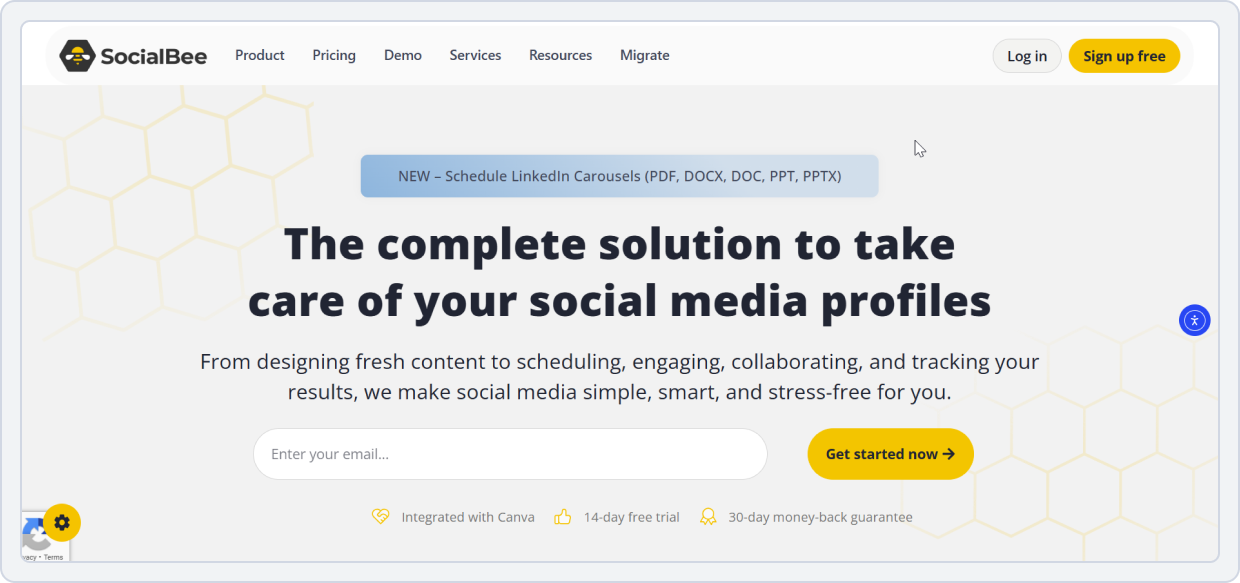
Overall Rating: ⭐⭐⭐⭐⭐ 4.8/5 (Capterra)
Starting Price: $24/month
SocialBee streamlines publishing with category-based scheduling, AI writing tools, and evergreen automation, creating the consistent rhythm many CoSchedule users need. It automatically balances varied post types across all major social channels.
Built for agencies handling multiple brands, it offers collaboration and recycling tools that maintain steady content flow without complicating workflows.
CoSchedule vs. SocialBee
The feature comparison of CoSchedule vs SocialBee is as follows.
1. Content Scheduling and Planning
SocialBee offers flexible social content scheduling with category-based queues and a visual calendar that helps teams organize posts across platforms. It also makes it easy to recycle evergreen content without manual effort. CoSchedule, in contrast, focuses on a calendar-first system primarily for structured campaign planning.
- Schedule posts across multiple platforms easily
- Use category-based queues for better organization
- Recycle evergreen posts automatically
SocialBee vs CoSchedule Key Takeaway: SocialBee excels at flexible scheduling and evergreen content management, while CoSchedule focuses on structured calendar planning.
2. AI-Powered Social Media Automation
SocialBee automates social posting using category-based queues and evergreen recycling, helping users keep accounts active without daily manual work. It focuses on smart scheduling rather than complex AI workflows.
- Automate posting with category-based queues
- Recycle evergreen content automatically
- Schedule posts across multiple platforms
SocialBee vs CoSchedule Key Takeaway: SocialBee excels at evergreen and queue-based automation, while CoSchedule focuses on campaign-driven scheduling automation.
3. Team Collaboration and Workflow
SocialBee supports team collaboration by allowing users to manage roles, organize content, and coordinate publishing from a shared dashboard. It keeps workflows simple and easy to manage for small teams.
- Assign roles and permissions to team members
- Collaborate on content scheduling in one workspace
- Manage multiple brands with shared access
SocialBee vs CoSchedule Key Takeaway: SocialBee works well for small teams with simple collaboration needs, while CoSchedule is better suited for structured team approvals and campaign workflows.
4. AI Content Generation
SocialBee includes AI-powered content tools to help users generate captions, post ideas, and variations quickly, making content creation faster and easier. It’s designed to support everyday social posting.
- Generate social media captions and post ideas using AI
- Create content variations for different platforms
- Speed up content creation for daily posting
SocialBee vs CoSchedule Key Takeaway: SocialBee excels at AI-assisted social content creation, while CoSchedule focuses on AI for marketing campaigns and long-form planning.
5. Platform Support & Integration
- SocialBee: Facebook, Instagram, LinkedIn, X (Twitter), Pinterest, TikTok, YouTube, and Google Business Profile
- CoSchedule: Facebook, LinkedIn, Instagram, X (Twitter), and Pinterest.
SocialBee vs CoSchedule Key Takeaway: SocialBee wins for broader social coverage and smart evergreen posting, while CoSchedule remains centered around standard network scheduling.
6. Pricing Comparison Table
Here’s how their pricing and plans compare at a glance.
| SocialBee (Monthly Pricing) | CoSchedule (Monthly Pricing) | |
|---|---|---|
| Platforms | Instagram, TikTok, YouTube, Facebook, X (Twitter), LinkedIn, Pinterest, Threads, Google Business Profile | Facebook, Instagram, LinkedIn, Pinterest |
| Bootstrap / Standard | Bootstrap: $24/month • 10 profiles • AI writer • Category scheduling |
Standard: $29/user • Manual planning |
| Accelerate / Suite | Accelerate: $40/month • 20 profiles • Evergreen content • Basic analytics |
$69/month – 10 social accounts – 3 users – Basic analytics |
| Pro / Standard | Bootstrap: $40/month • 25 profiles • 3/5 workspaces • Analytics up to 2 years of data |
Standard: $29/user • Manual planning |
| Verdict | Provides excellent value with its flat-rate monthly pricing, offering a high number of profiles and advanced features like AI and evergreen content scheduling. It is highly scalable for teams and agencies | The rigid per-user pricing makes it an expensive option that does not scale well for teams. |
SocialBee vs CoSchedule Final Takeaway:
SocialBee is the organized CoSchedule alternative for agencies and freelancers who thrive on structured content curation and category-based scheduling. Its intelligent evergreen recycling and white label support options make it perfect for teams managing multiple client accounts without the per-user pricing headaches.
How to Choose the Right CoSchedule Alternative for Your Marketing Workflow
Selecting the perfect CoSchedule alternative can be challenging, but by focusing on your specific needs, you can narrow it down quickly.
Most importantly, the right tool should seamlessly integrate into your marketing workflow management, saving you time and boosting results.
Here’s how to evaluate and choose wisely:
1. Identify Your Priorities:
Start by clarifying what matters most for your marketing workflow. If automation and AI-driven content creation top your list, consider alternatives to CoSchedule, such as SocialBu or FeedHive. These platforms offer smart post suggestions, bulk scheduling, and AI-assisted content creation, reducing manual work by nearly half.
2. Assess Team Size and Collaboration Needs:
When comparing CoSchedule alternatives, evaluate how many people will use the tool and how your team collaborates. For individual creators or small teams, cost-efficient options like RecurPost ($15/month) or OneUp ($18/month) are ideal, as they offer unlimited social profiles without per-user fees.
3. Evaluate Budget and Scalability:
Think long-term when comparing pricing and growth potential. As your operations expand, SocialBu’s $19/month flat-rate plan provides unlimited posting and scheduling, offering scalable value without the steep per-user pricing CoSchedule charges.
Wrap-Up
Finding the right CoSchedule alternatives can transform your marketing efficiency and results. While CoSchedule serves its purpose, the other options we’ve explored offer compelling advantages, from SocialBu’s comprehensive AI automation to ClickUp’s unbeatable pricing.
The best editorial calendar platform for your team depends on your specific needs, budget, and workflow preferences.
Most of these best CoSchedule alternatives for teams offer free trials, so you can test them risk-free before committing.
Whether you prioritize AI capabilities, affordability, or specific features like bulk scheduling, there’s an alternative that fits your needs perfectly. The key is identifying your must-have features and testing platforms that align with your marketing campaign management goals.
FAQs
What are the best marketing calendar alternatives to CoSchedule?
The top alternatives include SocialBu for comprehensive features, RecurPost for evergreen content, and Asana for project management. Each offers unique strengths depending on your specific needs.
Which content marketing tools offer better collaboration features?
SocialBu excels in collaboration with real-time approval workflows and team workspaces. ClickUp also offers extensive collaboration features within its broader workspace.
Are there more affordable alternatives to CoSchedule for small teams?
Yes! SocialBu starts at just $19/month for unlimited features, while RecurPost and OneUp also offer cheap CoSchedule alternatives 2026‑style for solopreneurs and freelancers.
What are the top CoSchedule competitors for editorial planning?
SocialBu, StoryChief, and Loomly are the top editorial calendar platforms, each offering intuitive scheduling and team collaboration that simplify content management.
Which tools provide better project management features than CoSchedule?
While Asana and ClickUp offer extensive project management capabilities, SocialBu provides the perfect balance between project management and social media focus. SocialBu’s task management integrates seamlessly with content scheduling, making it more practical for marketing teams.
Are there any free alternatives to CoSchedule’s marketing calendar?
SocialBu offers a generous free plan that includes basic features to get you started, unlike CoSchedule’s limited free option. Additionally, Asana, ClickUp, and Mailchimp provide free tiers, though SocialBu’s free plan is specifically designed for social media marketing needs
What are the best CoSchedule alternatives for social media planning?
SocialBu, SocialBee, and FeedHive excel specifically at social media planning with AI-powered features and automation.
Which competitors offer better integration options?
SocialBu stands out for its built‑in approval workflow and shared calendar. If you need project management depth, Asana and ClickUp are strong companions.
Do any alternatives provide better reporting features than CoSchedule?
SocialBu delivers comprehensive analytics with actionable insights across all social platforms, providing more detailed engagement metrics than CoSchedule’s basic reporting.
What are the most user-friendly CoSchedule alternatives?
SocialBu consistently receives top marks for user-friendliness with its intuitive interface and minimal learning curve.
Can I migrate my data from CoSchedule to these alternatives?
SocialBu offers dedicated migration support with CSV import options and personalized assistance to ensure a smooth transition from CoSchedule.
Which alternative is best for agencies managing multiple clients?
SocialBu excels for agencies with its unlimited posts, team collaboration tools, and client management features at an unbeatable price point.
Do these alternatives support video and multimedia content?
SocialBu handles all content formats, including videos, images, GIFs, and carousel posts across all supported platforms.
What’s the best CoSchedule alternative for AI-powered content creation?
SocialBu and FeedHive offer the most advanced AI content creation features, with FeedHive reducing content creation time by 40% through intelligent suggestions.
Which tools offer the best customer support compared to CoSchedule?
Marketers consistently praise SocialBu and Loomly for intuitive interfaces. SocialBu’s layout feels like a friendly assistant that lets you automate campaigns while sipping your coffee.
Are there CoSchedule alternatives specifically for small businesses?
SocialBu is perfectly tailored for small businesses with its affordable pricing, easy-to-use interface, and scalable features that grow with your company.
Which alternative offers the best ROI compared to CoSchedule?
SocialBu delivers the highest ROI with its $19/month pricing, providing features that would cost over $100/month with CoSchedule and additional tools combined.
Which CoSchedule alternative offers the best AI-powered features?
Among CoSchedule alternatives, SocialBu and FeedHive lead the way in AI content generation, caption writing, and scheduling optimization. These tools use smart algorithms to analyze performance and suggest improvements automatically.
Are CoSchedule alternatives better for agencies?
Yes. Platforms like SocialBu, RecurPost, and Loomly are designed with agencies in mind, offering client workspaces, white-label reporting, and bulk scheduling for multiple brands under one account.
What’s the easiest CoSchedule alternative for beginners?
When exploring CoSchedule alternatives for beginners, SocialBu stands out with its intuitive interface and built-in guidance, and Loomly is ideal for visual thinkers who enjoy drag-and-drop planning and post previews.

